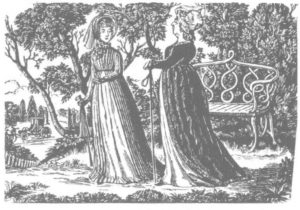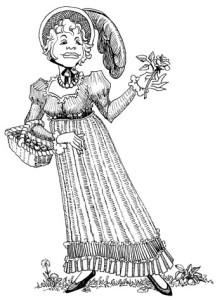
Elizabeth stands up to Lady Catherine
Jane Austen was a most judicious punisher of her least deserving characters. She had a high moral sense, as well as a wicked wit, and loved to mete out comeuppances as well as happy endings. Her comeuppances are generally very plausible and very fair, and the ones that might not seem entirely satisfactory, generally have an ironic twist to them that laughs at the way life sometimes turns out.
Going through the novels: In Pride and Prejudice Lady Catherine’s comeuppance is delightfully delicious, and highly ironic. She sallies out of Kent into Hertfordshire to order Elizabeth not to marry her nephew, and the upstart has the temerity to stand up to the great lady with unheard-of composure and the skill and articulation of an attorney (most remarkable in a twenty-year-old country girl, but then Elizabeth was a girl of no ordinary qualities). The irony is that when Lady Catherine gives Darcy a vehement description of Elizabeth’s insistence on marrying him if she chooses, this gives Darcy exactly the hope he needs. “Lady Catherine has been of infinite use, which ought to make her happy, for she loves to be of use,” Elizabeth remarks in amusement. Lady Catherine may be “not in the habit of brooking disappointment,” much less defeat, but she eventually is reconciled, and condescends to wait on the happy couple at Pemberley. Not such a very terrible comeuppance after all.
In Sense and Sensibility, we have a very backhanded comeuppance. Lucy Steele is despicably scheming, and after toying with Edward and marrying his brother, she wins over the nasty mother-in-law Mrs. Ferrars to favor her and her husband with the lion’s share of the fortune. In coldhearted manipulation she is the equal to her in-laws, the John Dashwoods, who have been monumentally cold and stingy to Mrs. Dashwood and her daughters. All these distasteful characters richly deserve comeuppance, if anyone ever did. But in Austen’s fiction as in life, only too often, such people do prevail. Lucy and her husband triumph financially and the John Dashwoods continue to prosper. Austen’s observation on the situation is perfect: “The whole of Lucy’s behaviour in the affair, and the prosperity which crowned it, therefore, may be held forth as a most encouraging instance of what an earnest, an unceasing attention to self-interest, however its progress may be apparently obstructed, will do in securing every advantage of fortune, with no other sacrifice than that of time and conscience.” Yet there is a comeuppance of sorts, and it is a masterpiece of Austenian irony and dry wit: “They [Lucy and Robert] settled in town, received very liberal assistance from Mrs. Ferrars, were on the best terms imaginable with the Dashwoods, and setting aside the jealousies and ill-will continually subsisting between Fanny and Lucy, in which their husbands of course took a part, as well as the frequent domestic disagreements between Robert and Lucy themselves, nothing could exceed the harmony in which they all lived together.”
In Emma, there really is no comeuppance worthy of the term. In one of the safest and sunniest of Austen’s novels, there are no great villains; the rude Mrs. Elton does not get invited to the wedding, it is true, but those who behave the worst do not receive any real punishment. Emma, who has been wrongheaded and conceited about her own judgment, learns a lesson, and is settled in marriage with the man she loves, who will help her to mature and think more judiciously. Frank Churchill, with his double dealing ways, behaves even worse than Emma does, but he, too, will improve with marriage to the upright character of Jane Fairfax. He is aware of this, and observes, “If you think me in a way to be happier than I deserve, I am quite of your opinion.” And Emma tells him seriously, “there is a likeness in our destiny; the destiny which bids fair to connect us with two characters so much superior to our own.”
Where is the comeuppance in Persuasion? Anne and Wentworth have one of the happiest romantic endings in literature; and their friend Mrs. Smith is looked after. Sir Walter is so robotically unfeeling and lacking in sensibility that comeuppance would be wasted on him, and Austen does not confer any; while Elizabeth is assigned the simple fate she deserves: no husband. The villain of the piece, Mr. Elliot, loses his hopes of Anne, and winds up in the scheming hands of Mrs. Clay. Jane Austen’s witty comment on this piece of distastefulness is: “it is now a doubtful point whether his cunning, or hers, may finally carry the day; whether, after preventing her from being the wife of Sir Walter, he may not be wheedled and caressed at last into making her the wife of Sir William.”
 Now, Mansfield Park is perhaps the most moralistic of Austen’s novels, and Austen takes such relish in assigning her punishments, that she performs the striking trick, for perhaps the only time, of hinting at suggested alternate endings for us to enjoy speculating about. (It is partly this technique that makes her so susceptible to being sequelized – she essentially played that game herself!) Fanny of course winds up happily with her cousin Edmund, and no one can doubt that the two, similar in dullness, duty, and domesticity, will be thoroughly content. But Austen slyly inserts a “Perhaps.” What if Fanny had accepted Henry Crawford, as she was expected to do? What then might have happened? Had Henry “persevered, and uprightly, Fanny must have been his reward, and a reward very voluntarily bestowed, within a reasonable period from Edmund’s marrying Mary.” So there is another possible turn of events. But Henry did not behave uprightly, and so Austen briskly assigns him his fate, along with a meditation on the difference in comeuppances for men as opposed to women. It is in such seemingly little asides that she lets us know her feelings and opinions in such matters: “That punishment, the public punishment of disgrace, should in a just measure attend his share of the offence is, we know, not one of the barriers which society gives to virtue. In this world the penalty is less equal than could be wished; but without presuming to look forward to a juster appointment hereafter, we may fairly consider a man of sense, like Henry Crawford, to be providing for himself no small portion of vexation and regret.” Henry’s punishment consists only of his regrets. Maria and Mrs. Norris on the other hand receive about as nasty a comeuppance as Jane Austen ever devised. After the great scandal of Mrs. Rushworth’s ill-starred dalliance with Henry Crawford, and her divorce, “where she could be placed” became the concern of her family. I wrote a scene about this in a comedy playlet for the Austen Variations Zoom play my son Paul and I performed in January, “Minor Reflections.” Since everyone will not have seen it, I take the liberty of repeating the scene in which we visit Maria Rushworth and her aunt Mrs. Norris at the distant cottage where they are rusticating, and where the two of them, in Jane Austen’s immortal words, “became each other’s punishment.” Here it is:
Now, Mansfield Park is perhaps the most moralistic of Austen’s novels, and Austen takes such relish in assigning her punishments, that she performs the striking trick, for perhaps the only time, of hinting at suggested alternate endings for us to enjoy speculating about. (It is partly this technique that makes her so susceptible to being sequelized – she essentially played that game herself!) Fanny of course winds up happily with her cousin Edmund, and no one can doubt that the two, similar in dullness, duty, and domesticity, will be thoroughly content. But Austen slyly inserts a “Perhaps.” What if Fanny had accepted Henry Crawford, as she was expected to do? What then might have happened? Had Henry “persevered, and uprightly, Fanny must have been his reward, and a reward very voluntarily bestowed, within a reasonable period from Edmund’s marrying Mary.” So there is another possible turn of events. But Henry did not behave uprightly, and so Austen briskly assigns him his fate, along with a meditation on the difference in comeuppances for men as opposed to women. It is in such seemingly little asides that she lets us know her feelings and opinions in such matters: “That punishment, the public punishment of disgrace, should in a just measure attend his share of the offence is, we know, not one of the barriers which society gives to virtue. In this world the penalty is less equal than could be wished; but without presuming to look forward to a juster appointment hereafter, we may fairly consider a man of sense, like Henry Crawford, to be providing for himself no small portion of vexation and regret.” Henry’s punishment consists only of his regrets. Maria and Mrs. Norris on the other hand receive about as nasty a comeuppance as Jane Austen ever devised. After the great scandal of Mrs. Rushworth’s ill-starred dalliance with Henry Crawford, and her divorce, “where she could be placed” became the concern of her family. I wrote a scene about this in a comedy playlet for the Austen Variations Zoom play my son Paul and I performed in January, “Minor Reflections.” Since everyone will not have seen it, I take the liberty of repeating the scene in which we visit Maria Rushworth and her aunt Mrs. Norris at the distant cottage where they are rusticating, and where the two of them, in Jane Austen’s immortal words, “became each other’s punishment.” Here it is:
MRS. NORRIS: Maria! Maria, where are you?
MARIA: (adjusting her clothes) Right here, aunt. Where else could I be?
MRS. NORRIS: I do not at all know. I have been searching for you this half hour.
MARIA: As our cottage has but three rooms and an attic, I cannot imagine how you have extended your search so long.
MRS. NORRIS: You were not in any of the rooms, or the attic!
MARIA: Really!
MRS. NORRIS: I collect that you must have gone outside.
MARIA: And why should I not go outside? I am not a prisoner. Though you do try to make me one.
MRS. NORRIS: I? I am not your gaoler. I merely am concerned for your safety. You never know what will happen when you go out of doors. Why, you might meet someone.
MARIA: I did meet someone.
MRS. NORRIS: See? I told you so. Who was it, pray tell?
MARIA: Only the dairy farmer, from down the lane.
MRS. NORRIS: And what could he want?
MARIA: An order of milk, to be sure.
MRS. NORRIS: Well, that is certainly very presuming of him! Does he not know that we do not drink milk?
MARIA: I told him that we will, from now on. He is a very – pleasing young man.
MRS. NORRIS: Pleasing? What does that have to do with it? How much does he want for the milk?
MARIA: Oh I do not know. He told me but I forget. Sixpence I believe. We will meet tomorrow by the large tree, and he will have something for me.
MRS. NORRIS: (outraged) Sixpence! When they only ask thruppence in town! Maria, you will bring us to ruin!
MARIA: (sullenly) According to you, I have already done that, so I can hardly do any thing worse.
MRS. NORRIS: You certainly have. Not that it is entirely your fault, I know you would have married Mr. Crawford very properly had not that little Fanny come in the way. Oh, how I regret the day I brought her to Mansfield Park. She has been the ruination of us all.
MARIA: I don’t know how she has ruined you. You are quite comfortable here, and supported very generously by my father, with no expense to yourself at all.
MRS. NORRIS: Expense! He does not send half enough for us to live as gentlewomen, and if I was not used to stringency in my private economies we should be in a sad way. I wish you would ask the dairy farmer how much we would have to give for a nice Stilton cheese. Perhaps, seeing as how you are so friendly, he will give us a better price.
MARIA: I don’t care about the cheese, aunt. What I want is to go to town. I hate the country.
MRS. NORRIS: My dear, how can you go to town? You are disgraced and cannot appear in good society. Do you mean to go to Mr. Crawford and remonstrate with him again?
MARIA: (bitterly) It would do no good. He has made his feelings only too clear. But I might meet – someone else.
MRS. NORRIS: I beg you must not entertain such an idea. If you should go into another gentleman’s – keeping, it must blacken your family’s name forever. What would Edmund say! And Fanny!
MARIA: I don’t give a fig for what those mewling prigs would say!
MRS. NORRIS: But your father would stop your income – and then what would become of ME?
MARIA: I don’t really care. You have quite sufficient income of your own. I must tell you that I still have not entirely lost hope of Henry Crawford, and I mean to go to town to have one last interview with him.
MRS. NORRIS: If you do that, I will write to your father at once. And how can you be so silly. You have just said you know Mr. Crawford will not have you.
MARIA: He may have changed his mind. I will tell him of my feelings for him.
MRS. NORRIS: Maria, you are simply not a girl of very much sense, are you. I do wish you would take some discreet older woman as a model to follow, such as myself. You have much to learn of propriety, and restraint. My advice to you is to sit down by this good fire and work on your stitchery.
MARIA: I can’t bear to, Aunt. You have let the fire go out.
MRS. NORRIS: The price of kindling, my dear!
MARIA: And besides it is a shame to waste such a beautiful day sitting indoors. I believe I must go out again.
MRS. NORRIS: Maria, I am astonished! Where will you go this time?
MARIA: Down toward the village. The baker will have something for me at three o’clock.
MRS. NORRIS: The baker? What is he giving you?
MARIA: Oh, I don’t know. Something very delicious I am sure. Some bread sticks, I fancy.
MRS. NORRIS: Don’t let him ask for too much money, Maria. You must always be prudent. Remember that.
MARIA: I am in no danger of forgetting, Aunt.
MRS. NORRIS: Very well then. You might bring me a small cottage loaf, if you can get it for no more than tuppence.
MARIA: I imagine Baker Harry will throw it in for nothing.
In our Comeuppances discussion there is only Northanger Abbey left for us to examine, but, as it happens, I have written a fiction about that circumstance, too. In my novel The Bride of Northanger, I give the odious General Tilney a comeuppance of Gothic proportions, and leave the other characters to contemplate his murder. As authors will, I therefore close my musings with an advisement for the purchase of my book. The Bride of Northanger is available on Amazon, as a Kindle ebook and in paperback. Do have at it!


6 comments
Skip to comment form
OMG! Your skit was hilarious. Wow! Maria was a piece of work, to be sure. Thanks for sharing. I am enjoying these comeuppance posts. Stay safe and healthy.
Author
Thanks, J.W. – I loved the comeuppance theme idea, it was a particularly juicy one! And now I’m glad I posted the Maria skit, because our whole Austen Variations audience didn’t see it.
so fun!
Author
Thanks, Denise!
Clever and well thought out comments about that topic. Good luck with the new story. Stay safe, everyone.
Author
Glad you liked it – Comeuppance sure was a great subject for this month. You stay safe too, Sheila!